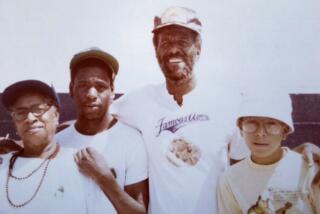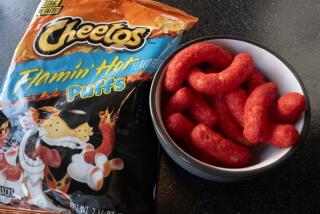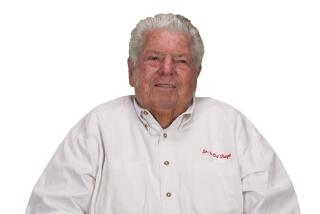Leonard Marsh dies at 80; cofounder and former CEO of Snapple
Leonard Marsh, a window washer from Brooklyn who struck it rich after he and two of his boyhood pals created a soft drink called Snapple, has died. He was 80.
Marsh, Snapple’s former chief executive, died Tuesday at his home in Manhasset, N.Y., his family announced. The cause was not disclosed.
He and his partners — brother-in-law Hyman Golden and longtime friend Arnold Greenberg — grew up in Brooklyn’s Brownsville neighborhood without much beyond their ambitions.
PHOTOS: Notable deaths of 2013
Born Jan. 5, 1933, Marsh was the son of Jewish immigrants from Russia. His father was a cobbler. After graduating from high school, Leonard Marsh was an egg dealer and a garment district worker before settling with Golden into a window-washing and office maintenance business.
Meanwhile, their friend Greenberg was running his father’s deli in New York’s East Village — a small business that morphed into a health food store as the changing neighborhood lost its Eastern European immigrants and began drawing hippies by the busload.
In the early 1970s, the trio collaborated on a part-time venture that sold organic juices to stores like Greenberg’s. It was called Unadulterated Fruit Juices and never made much money. Marsh kept washing windows.
“Then one day we woke up,” he once told an interviewer. “We realized we had a business.”
They hired a salesman.
They came up with a distinctive product, an apple soda, whose sales flat-lined immediately.
They called it “Snapple” — a hybrid of “snappy” and “apple” — and were undeterred even when they had to shell out $500 to a man in Texas who, it turned out, owned the name.
In a saga that might sound quaint because it took decades and doesn’t involve a teenage computer genius holed up in his bedroom, they each threw in $6,000 and wound up with wealth beyond any they had imagined.
“This is the American story,” said Tom Pirko, president of Bevmark, a Santa Barbara-based food and beverage industry consultant. “They saw an opportunity, they were clever, they were certainly aggressive, and they jumped in. They hit it just right.”
Snapple emphasized natural ingredients and came in a retro-style heavy glass bottle. Its flavors, including Mango Madness, Peach Passionfruit and dozens of others, were as distinctively colorful as tie-dye T-shirts. In 1987, Snapple hit the jackpot with its flavored iced teas. By 1994, the company’s annual sales topped $674 million.
“We built a better mousetrap, nothing more,” Marsh once told Beverage World magazine. “Tea was around for many years. We made it better.”
Of course, savvy marketing helped. Snapple’s chief pitchmen were Rush Limbaugh and Howard Stern, controversial figures with huge radio audiences. Wendy Kaufman, a large, friendly New Yorker who answered mail in Snapple’s office, appeared in a number of commercials, underscoring the company’s effort to maintain its down-to-earth image.
In a zany 1993 spot, Kaufman reads a letter from a “retired colonel in Kentucky,” complimenting Snapple as “the only good thing ever to come out of New York City.” In the next scene, former New York Mayor Ed Koch knocks on the colonel’s door and patiently explains that the city gave rise to the corned-beef sandwich and the elevator — in addition to Snapple.
It all prompted some critics to cry enough, already. In Adweek, a writer complained that Snapple commercials “had all the visual charm of a flammable leisure-suit set off by cheesy vinyl shoes.”
Marsh was unruffled.
“We dealt with the plain people of America — that’s who we wanted to attract,” he once said. “Of the 260 million people in America, 258 million of them are plain people. I wanted the 258 million to drink Snapple.”
In 1994, Quaker Oats bought Snapple for $1.7 billion, a price that astonished some observers because the “alternative” soft drink field had already become so crowded. The three Snapple partners each received more than $127 million. Greenberg died in 2008 and Golden in 2012.
Marsh stayed on for two years after the sale. He was supposed to be an executive vice president but complained that Quaker never talked to him and was making tragic errors in its marketing.
Three years later, Snapple was sold again, this time for $300 million. The Los Angeles Times called the original deal “one of the worst flops in corporate-merger history.”
Snapple has undergone several ownership changes and is now owned by Dr Pepper Snapple Group Inc. of Plano, Texas. In a statement this week, company Vice President Jim Trebilcock, playing off a longtime Snapple ad slogan, said Marsh and his partners had “brought the best stuff on Earth to the masses. Today we tip our Snapple cap in his honor.”
Marsh is survived by Marian Ebner Marsh, his wife of 57 years, daughter Robin Ross, sons Bradley Marsh and Peter Marsh, eight grandchildren and a sister, Mildred Golden.
More to Read
Sign up for Essential California
The most important California stories and recommendations in your inbox every morning.
You may occasionally receive promotional content from the Los Angeles Times.











